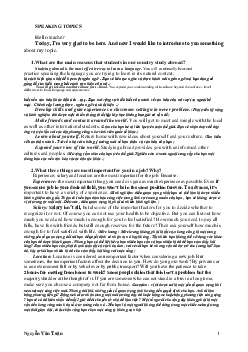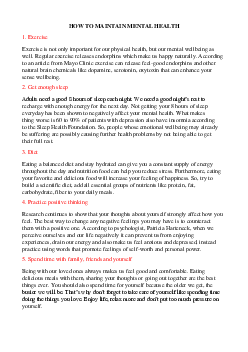





Preview text:
lOMoAR cPSD| 41487872
CLIMATE CHANGE / GLOBAL WARMING
. What do you predict will happen to the environment in the next five years?
According to various sources, the environment is likely to face more challenges in the next
five years, such as rising temperatures, extreme weather events, sea level rise, biodiversity
loss, and resource depletion . Some scientists warn that the planet may cross some critical
tipping points that could have irreversible consequences for the climate and the biosphere .
. What are the consequences of climate change?
The consequences of climate change are manifold and affect the physical environment,
ecosystems, and human societies. Some of the impacts include more heat waves, droughts,
floods, storms, wildfires, diseases, food insecurity, water scarcity, displacement, conflict,
and poverty . These impacts are expected to worsen as the global average temperature continues to rise.
. What are some current environmental issues?
Some of the current environmental issues that require urgent attention are global warming
from fossil fuels, deforestation and forest degradation, ocean pollution and acidification,
plastic waste and microplastics, loss of biodiversity and ecosystem services, soil erosion and
degradation, and unsustainable consumption and production patterns
. How do we build a sustainable world?
To build a sustainable world, we need to transform our economic and social systems to
align with the principles of the circular economy, which aims to reduce resource use, reuse
and recycle materials, and regenerate natural resources . We also need to adopt more
sustainable lifestyles and behaviours, such as eating less meat, reducing food waste,
choosing renewable energy sources, avoiding single-use plastics, and supporting green
businesses and initiatives . Additionally, we need to cooperate and collaborate at all levels,
from individuals and communities to governments and organizations, to implement the
Sustainable Development Goals, which are a universal framework for achieving a better
and more sustainable future for all . VOCABULARY
major, long-term changes to global weather
patterns. Climate change can occur
naturally or it can be driven by human Climate change (noun):
actions. Climate change can disrupt the
balance of nature and threaten vulnerable species with extinction. lOMoAR cPSD| 41487872
a rise in the earth’s temperature caused by
an increase in greenhouse gases. If left Global warming (noun):
unchecked, global warming leads to climate
change which can be harmful for the environment.
gases that allow radiation from the sun to
pass through the earth’s atmosphere, and
Greenhouse gases (noun):
trap outgoing heat from the earth’s surface.
Greenhouse gases include carbon dioxide, nitrous oxide, and methane.
the effect that greenhouse gases have on the environment. Without the greenhouse
Greenhouse effect (noun):
effect, life on earth would cease to exist but
human pollution intensifies it, and that can lead to problems.
a colourless gas making up 0.042% of
Earth’s atmosphere. It is produced when animals breathe out or when carbon and
Carbon dioxide (CO2) (noun):
organic compounds are burned. CO2 is an
important greenhouse gas without which
our planet would be inhospitably cold.
the release of carbon into the atmosphere as
Carbon emissions (noun):
a result of the burning of fossil fuels.
sources of energy derived from the remains Fossil fuels (noun):
of living things that died a long time ago.
Gas, coal, and oil are all fossil fuels.
gases and other substances discharged into Emissions (noun):
the air, such as plumes of smoke from coal-
fired power stations or car exhaust fumes.
the mixture of gases surrounding the earth and other planets. Earth’s atmosphere
consists primarily of 78% nitrogen, 21% Atmosphere (noun):
oxygen and 0.9% argon with the remaining
0.1% coming from trace amounts of carbon
dioxide, methane, water vapour and other gases.
energy generated by the sun. Solar radiation
Solar radiation (noun):
is filtered by the atmosphere.
the atmospheric conditions which relate to a Weather (noun): specific time and place.
typical weather conditions for a specific Climate (noun): part of the world. lOMoAR cPSD| 41487872
when a plant or animal species dies out, it Extinction (noun): becomes extinct.
the variety of life forms that are found in a particular area, including the different Biodiversity (noun): species of plants, animals and microorganisms
actions taken to adjust to the effects of Adaptation (noun):
climate change, for example building sea
walls to protect against rising sea level.
the study of finding ways to change the Geo-engineering
earth's atmosphere in order to reduce global warming Ambitious (adj) tham vọng Dependence on phụ thuộc vào Volume (n) dung tích Inevitable (adj) không tránh khỏi Reasonable (adj) hợp lý Emission sự thải ra Stride
sự tiến bộ- advance, progress,
Cause of environmental problems (Các nguyên nhân gây ra vấn đề về môi trường)
exhaust gas (n) khí thải gas
fossil fuels (n) nhiên liệu hóa thạch (than, dầu, quặng,…)
carbon emissions (n) khí thải carbon
illegal dumping (n) xả rác trái quy định
habitat destruction (n) phá hủy môi trường sống tự nhiên
intensive farming (n) canh tác quá
mức overpopulation (n) dân số quá lớn
overgrazing (n) chăn thả quá mức)
Global issues (Các vấn đề toàn cầu)
global warming (n) sự nóng lên toàn
cầu climate change (n) biến đổi khí hậu
carbon footprint (n) dấu chân carbon (từ lóng), chỉ hệ quả của quá trình sử dụng carbon để lại
greenhouse gases (n) khí thải nhà kính
the greenhouse effect: hiệu ứng nhà kính
temperatures soar (n) sự tăng nhiệt độ, sự nóng lên lOMoAR cPSD| 41487872
natural disaster (n) thảm họa thiên
nhiên soil degradation (n) xói mòn đất
ozone layer depletion (n) suy thoái tầng ozone, thủng tầng ozone
endangered species (n) sinh vật đứng gần bờ vực tuyệt chủng
Pollution (Sự ô nhiễm)
air pollution (n) ô nhiễm không khí
environmental pollution (n) ô nhiễm không
khí marine pollution (n) ô nhiễm đại dương
water pollution (n) ô nhiễm nguồn nước
industrial pollution (n) ô nhiễm công
nghiệp noise pollution (n) ô nhiễm tiếng ồn
vehicle pollution (n) ô nhiễm phương
tiện soil pollution (n) ô nhiễm đất
Pollution from garbage (Ô nhiễm rác thải)
dangerous/harmful/hazardous/poisonous/toxic waste (n) chất thải độc
hại domestic waste = household waste (n) rác thải sinh hoạt
industrial waste (n) rác thải công
nghiệp landfill (n) bãi rác
contaminate (v) làm ô nhiễm
contamination (n) sự ô nhiễm
contaminated (adj) bị nhiễm độc = toxic (adj)
to litter: vứt (rác)
Saving the environment (Cứu lấy môi trường)
environmentally friendly = eco-friendly (adj) thân thiện với môi
trường eco-friendly source (n) nguồn nhiên liệu thân thiện
sustainable energy source (n) nguồn nhiên liệu bền
vững renewable energy (n) năng lượng tái tạo
alternative energy (n) năng lượng thay
thế solar power (n) năng lượng mặt trời
wind farms (n) cánh đồng điện gió (khu sử dụng điện gió làm năng
lượng) wildlife conservation (n) bảo tồn thiên nhiên hoang dã
green technology (n) công nghệ xanh
sustainable living (n) sống bền vững
green taxes (n) thuế bảo vệ môi trường
biodegrable packaging (n) bao bì sinh học có thể phân hủy lOMoAR cPSD| 41487872
2. Collocation thường gặp
environmental problem (n) các vấn đề về môi trường
environmental degradation (n) sự suy thoái của môi trường
conservation of the environment ≈ protection of the environment (n) sự bảo vệ môi trường
damage to the environment ≈ harmful to the environment gây hại đến môi
trường to prevent pollution: ngăn chặn ô nhiễm
to fight/combat pollution: giải quyết ô nhiễm
to control/monitor pollution: kiểm soát ô nhiễm
to cut/reduce/minimalize pollution: giảm thiểu ô nhiễm
dump/get rid of/dispose of waste: vứt rác → waste disposal (n)
to handle/manage/process waste: xử lý rác → waste treatment/management (n)
cut down on/reduce waste: giảm thiểu rác → waste reduction
(n) easily recycleable (adj) có thể dễ dàng tái chế PHRASES
Climate change is a serious problem that affects everyone on the planet.
Global warming is caused by the burning of fossil fuels, which release carbon
dioxide and other greenhouse gases into the atmosphere.
We need to take action now to reduce greenhouse gas emissions and limit the rise of global temperature.
Climate change impacts the environment, the economy, and human health in many ways.
Global warming increases the frequency and intensity of extreme weather
events, such as heat waves, droughts, floods, and storms.
Climate change threatens the survival of many species and ecosystems,
especially those that are sensitive to temperature changes.
Global warming also affects the availability and quality of water, food, and energy resources.
Climate change requires global cooperation and collective action to find effective solutions.
Global warming can be slowed down and reversed by switching to clean
and renewable energy sources, such as solar, wind, and hydro power.
Climate change also offers opportunities for innovation and development of
new technologies and practices that are more sustainable and resilien.
Climate change is a global challenge that requires a global response.
Global warming is the result of human activities that increase greenhouse gas emissions.
We need to reduce our carbon footprint and adopt more renewable energy sources. lOMoAR cPSD| 41487872
The effects of climate change are already visible in the melting of glaciers, the
rising of sea levels, and the changing of seasons.
Global warming poses a serious threat to the health and well-being of people and wildlife.
We have a moral responsibility to protect the environment and prevent further damage from climate change.




